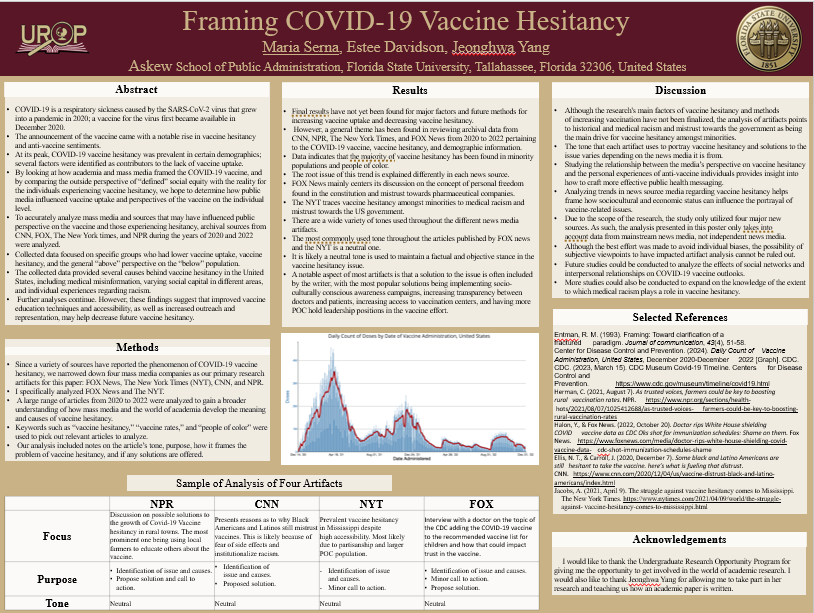Research Symposium
24th annual Undergraduate Research Symposium, April 3, 2024
Maria Serna Poster Session 4: 2:45 pm - 3:45 pm /82

BIO
I am a Colombian student currently attending FSU seeking a degree in biology; I plan to attend medical school to become a psychiatrist. I have faced a multitude of challenges as I adjust to living in America, many of which I would have never overcome if not for my loved ones and dreams pushing me forward. My main academic interests lie in public health, microbiology, and human behavior. My main philosophy in life is to maintain an open mind. As Martha Stewart says, "Without an open-minded mind, you can never be a great success."
Framing COVID-19 Vaccine Hesitancy
Authors: Maria Serna, Jeonghwa YangStudent Major: Biology
Mentor: Jeonghwa Yang
Mentor's Department: Public Administration Mentor's College: Florida State University's Askew School of Public Administration Co-Presenters:
Abstract
COVID-19 is a respiratory sickness caused by the SARS-CoV-2 virus. In 2020, the virus grew into a pandemic, and a vaccine for the virus first became available in December 2020. However, with the vaccine came a notable rise in vaccine hesitancy and anti-vaccine sentiments that limited the uptake of the vaccine in many groups. At its peak, COVID-19 vaccine hesitancy was prevalent in certain areas and demographics, and several factors were identified as contributors to the lack of vaccine uptake. By looking at how academia and mass media framed the COVID-19 vaccine and by comparing the outside perspective of “defined” social equity with the reality of the individuals experiencing vaccine hesitancy, we hope to determine how public media and “views from above” influenced perspectives of and vaccine uptake for “views from below." To accurately analyze mass media and sources that may have influenced public perspectives on the vaccine and those experiencing hesitancy, archival sources from CNN, FOX, The New York Times, and NPR 2020 were analyzed. Collected data focused on specific groups who had lower vaccine uptake, vaccine hesitancy, and the general “above” perspective on the “below” subjects. The collected data provided several causes behind vaccine hesitancy in the United States, including misinformation, lack of vaccine education and availability, varying social capital in different areas, and individual experiences. Further analyses are continuing. However, these findings suggest that improved vaccine education techniques and accessibility, as well as increased outreach and representation, may help decrease future vaccine hesitancy.
Keywords: Covid-19 Vaccine, Vaccine Hesitancy, Public health, Minorities

